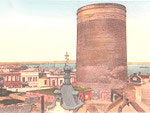 |
| source: avialine.com |
Favorable climatic and geographical conditions of the region were the reason why people came there in ancient times. The oil and salt deposits stored in the bowels of the Absheron Peninsula, convenient coastal location – were the factors that contributed to the early colonization of the territory.
However, the question of how old exactly Baku is still remains unanswered.
Not far from Baku, in Gobustan, 10,000-year-old petroglyphs were found. The drawings depict hunting scenes and rituals of the ancient settlers. The ancient Zoroastrian burial sites found on the old Muslim cemetery in 1888 also testify to the city’s age.
The written sources mentioning Baku invariably refer to its “eternal flames” and its sources of oil. To get oil there, caravans arrived from all over the Middle East.
In the second half of the 9th century the Shirvanshahs state was established there. From the 9th century on Baku was surrounded by walls. At the same period, under the rule of Akhsitan I, a powerful fleet of Baku was built. In the 12th century Azerbaijan faced the Mongol invasion, and after the long siege the city surrendered. As a punishment for resistance the whole city was ruthlessly pillaged and destroyed.
In the beginning of the 14th century the peaceful life returned, but in 1501 Shah Ismail Khatai of the Safavid dynasty invaded Shirvan and laid siege to Baku. The city treasury lost a lot of jewelry. Shirvanshakh state lasted until 1538, when the Safavid ruler Shah Takhmasib annexed Shirvan to his state.
From the second half of the 14th century and the early 16th century there were continuous wars between the State of the Safavid and Ottoman Turkey; as a result Baku repeatedly changed its rulers. In 1612, under the treaty Azerbaijan came into the possession of the Safavids. The termination of wars and the establishment of centralized authority gave impetus to the development of the country. Copper coins were minted, carpet weaving was developed, oil and salt were extracted.
In the 18th century the wealth of natural resources attracted the attention of the Russian Tsar, Peter I. To capture the Caspian lands he organized a naval expedition. In 1973 Baku surrendered to Russians. But in 1735 Baku again came under the authority of Iran.
After the death of Nadir Shah the empire disintegrated and the territory of Azerbaijan was divided into a host of independent states; one of the most influential of those was the Baku Khanate.
During the 18th – 19th centuries the struggle for that territory between Russia and Iran never stopped. With the end of the last Russian-Iranian war in 1828, the countries signed Turkmenchay Treaty, under which Azerbaijan was divided between Russia and Iran. Baku was assigned to Russia. At that time, the city limits lied within the walls of the old city, and only after the Russian-Iranian war the process of growth started.
The city began to develop in all sectors in 1848. There the first oil well in the world was drilled. By the beginning of the 20th century Baku extracted almost half of the world’s oil reserves.
Factories, power plants, banks, shipping companies started to emerge. In 1883 the railway connecting Baku and Tbilisi was opened. In 1873 the first Azerbaijani National Theatre was established; in 1875 the first newspaper was published. The city kept growing - by 1883 Baku had 45 thousand inhabitants and in 1913 – 200,000.
On 28 May 1918 the Azerbaijan Democratic Republic, headed by the Musavat Party, was proclaimed. But in March 1922 the treaty was signed establishing the Federative Union of the Transcaucasian Republics, subsequently transformed into the Transcaucasian Federative Republic. In December of the same year the Transcaucasian Republic joined the USSR; in 1936 under the new Constitution of Azerbaijan, Georgia and Armenia became independent republics within the USSR. After the collapse of the USSR the Supreme Soviet of Azerbaijan adopted the declaration “On restoration of state independence of Azerbaijan.” According to the Declaration on October 18, 1991 the sovereign Republic of Azerbaijan was proclaimed. And once again Baku became the capital city of the independent state.







